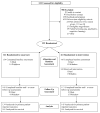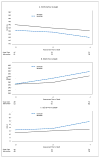Effects of a palliative care intervention on clinical outcomes in patients with advanced cancer: the Project ENABLE II randomized controlled trial
- PMID: 19690306
- PMCID: PMC3657724
- DOI: 10.1001/jama.2009.1198
Effects of a palliative care intervention on clinical outcomes in patients with advanced cancer: the Project ENABLE II randomized controlled trial
Abstract
Context: There are few randomized controlled trials on the effectiveness of palliative care interventions to improve the care of patients with advanced cancer.
Objective: To determine the effect of a nursing-led intervention on quality of life, symptom intensity, mood, and resource use in patients with advanced cancer.
Design, setting, and participants: Randomized controlled trial conducted from November 2003 through May 2008 of 322 patients with advanced cancer in a rural, National Cancer Institute-designated comprehensive cancer center in New Hampshire and affiliated outreach clinics and a VA medical center in Vermont.
Interventions: A multicomponent, psychoeducational intervention (Project ENABLE [Educate, Nurture, Advise, Before Life Ends]) conducted by advanced practice nurses consisting of 4 weekly educational sessions and monthly follow-up sessions until death or study completion (n = 161) vs usual care (n = 161).
Main outcome measures: Quality of life was measured by the Functional Assessment of Chronic Illness Therapy for Palliative Care (score range, 0-184). Symptom intensity was measured by the Edmonton Symptom Assessment Scale (score range, 0-900). Mood was measured by the Center for Epidemiological Studies Depression Scale (range, 0-60). These measures were assessed at baseline, 1 month, and every 3 months until death or study completion. Intensity of service was measured as the number of days in the hospital and in the intensive care unit (ICU) and the number of emergency department visits recorded in the electronic medical record.
Results: A total of 322 participants with cancer of the gastrointestinal tract (41%; 67 in the usual care group vs 66 in the intervention group), lung (36%; 58 vs 59), genitourinary tract (12%; 20 vs 19), and breast (10%; 16 vs 17) were randomized. The estimated treatment effects (intervention minus usual care) for all participants were a mean (SE) of 4.6 (2) for quality of life (P = .02), -27.8 (15) for symptom intensity (P = .06), and -1.8 (0.81) for depressed mood (P = .02). The estimated treatment effects in participants who died during the study were a mean (SE) of 8.6 (3.6) for quality of life (P = .02), -24.2 (20.5) for symptom intensity (P = .24), and -2.7 (1.2) for depressed mood (P = .03). Intensity of service did not differ between the 2 groups.
Conclusion: Compared with participants receiving usual oncology care, those receiving a nurse-led, palliative care-focused intervention addressing physical, psychosocial, and care coordination provided concurrently with oncology care had higher scores for quality of life and mood, but did not have improvements in symptom intensity scores or reduced days in the hospital or ICU or emergency department visits.
Trial registration: clinicaltrials.gov Identifier: NCT00253383.
Figures




Comment in
-
Study design and palliative care intervention.JAMA. 2009 Dec 16;302(23):2551; author reply 2551. doi: 10.1001/jama.2009.1828. JAMA. 2009. PMID: 20009052 No abstract available.
-
Nurse-led multicomponent psychoeducational palliative intervention improves quality of life and mood in patients with advanced cancer.Evid Based Nurs. 2010 Feb;13(1):9-10. doi: 10.1136/ebn1007. Evid Based Nurs. 2010. PMID: 20179053 No abstract available.
References
-
- American Cancer Society. Cancer Facts and Figures 2007. Atlanta, GA: American Cancer Society; 2007.
-
- Field MJ, Cassel CK. Approaching Death: Improving Care at the End of Life. Washington, D.C: National Academy Press; 1997. - PubMed
-
- Foley KM, Gelband H. Improving Palliative Care for Cancer. Washington, D.C: Institute of Medicine and National Research Council; 2001. - PubMed
-
- Morrison RS, Meier DE. Clinical practice. Palliative care. N Engl J Med. 2004 Jun 17;350(25):2582–2590. - PubMed
-
- World Health Organization. [Accessed December, 2005];Palliative Care: What is it. www.who.org.

